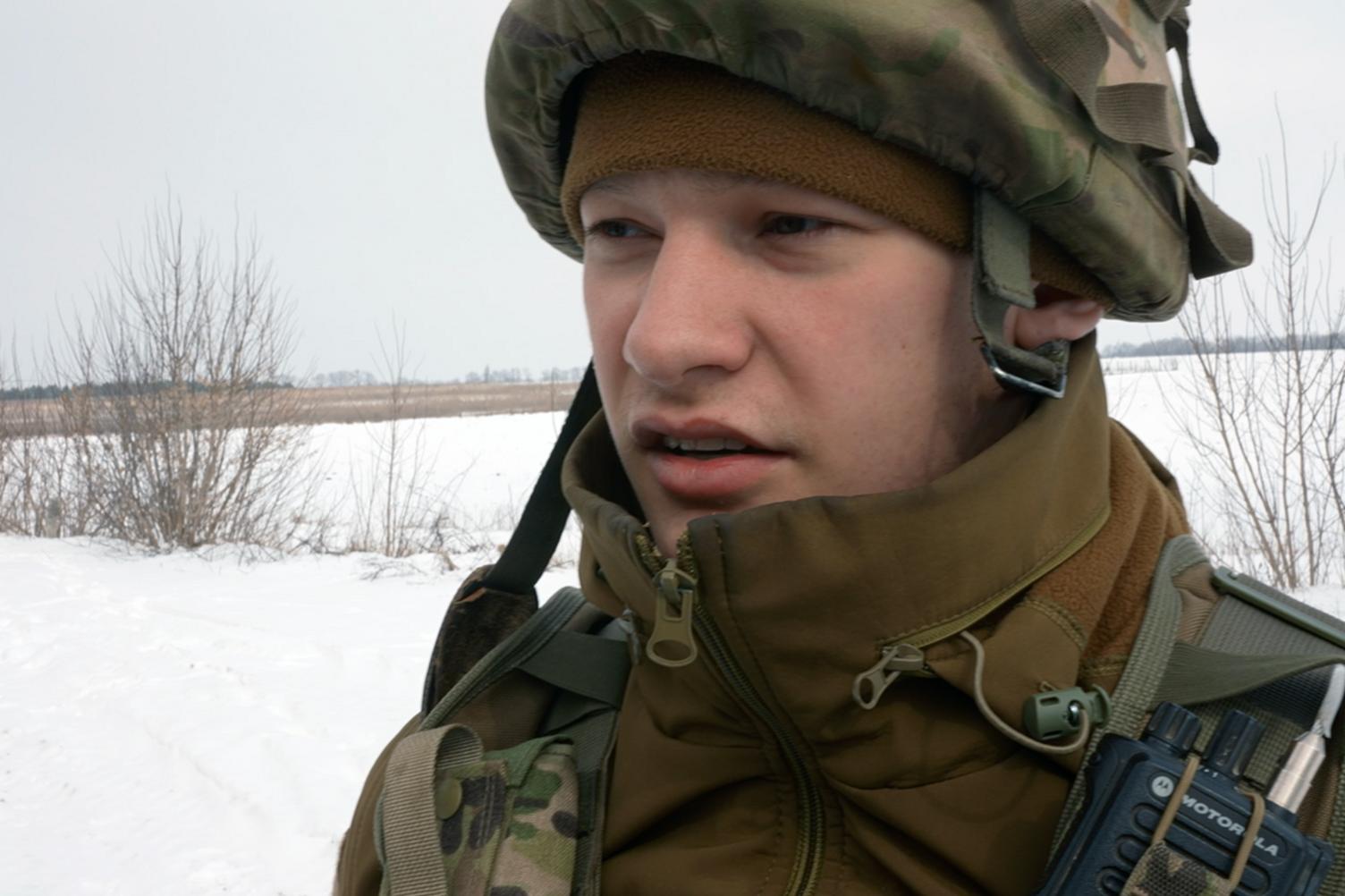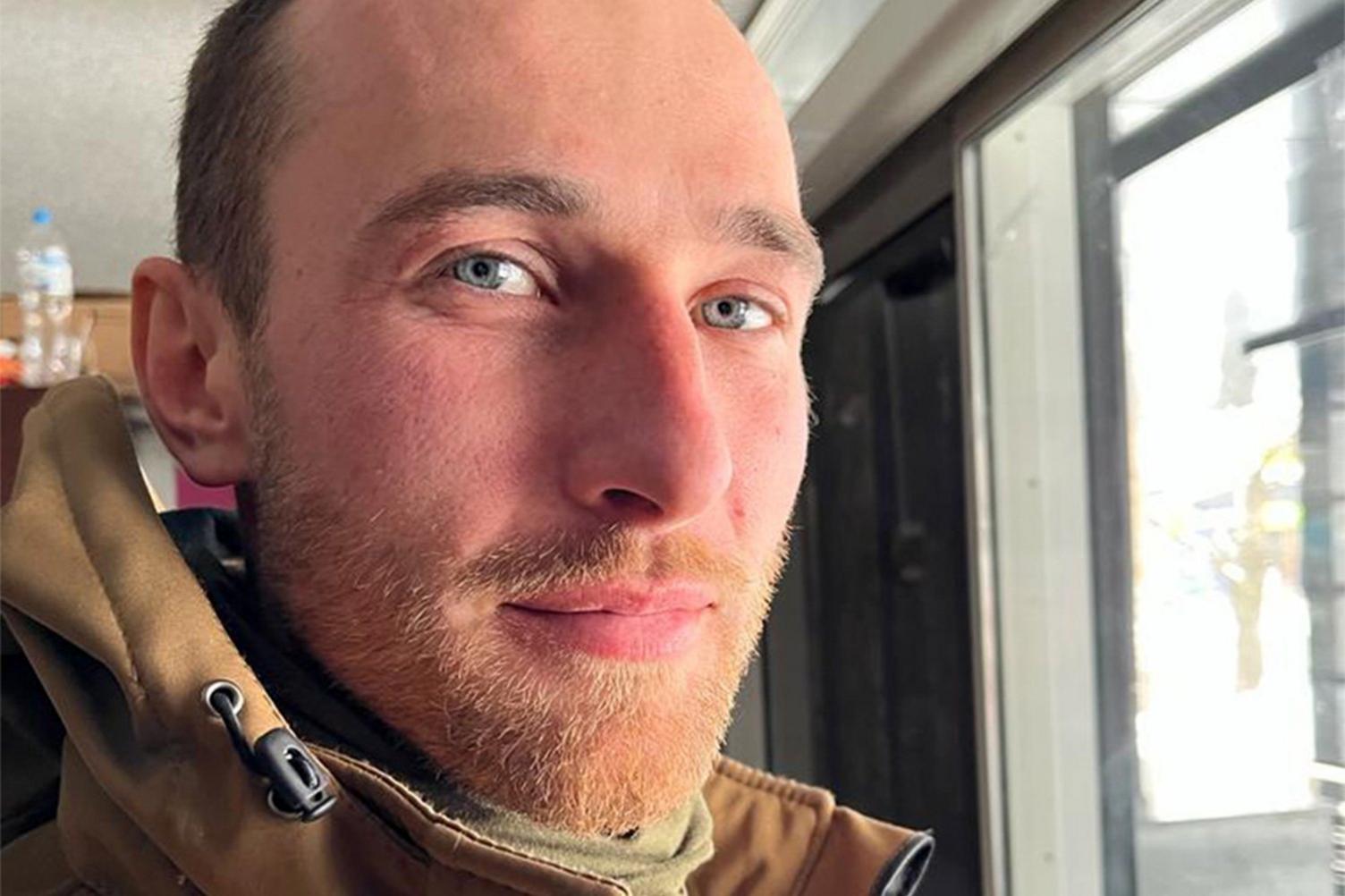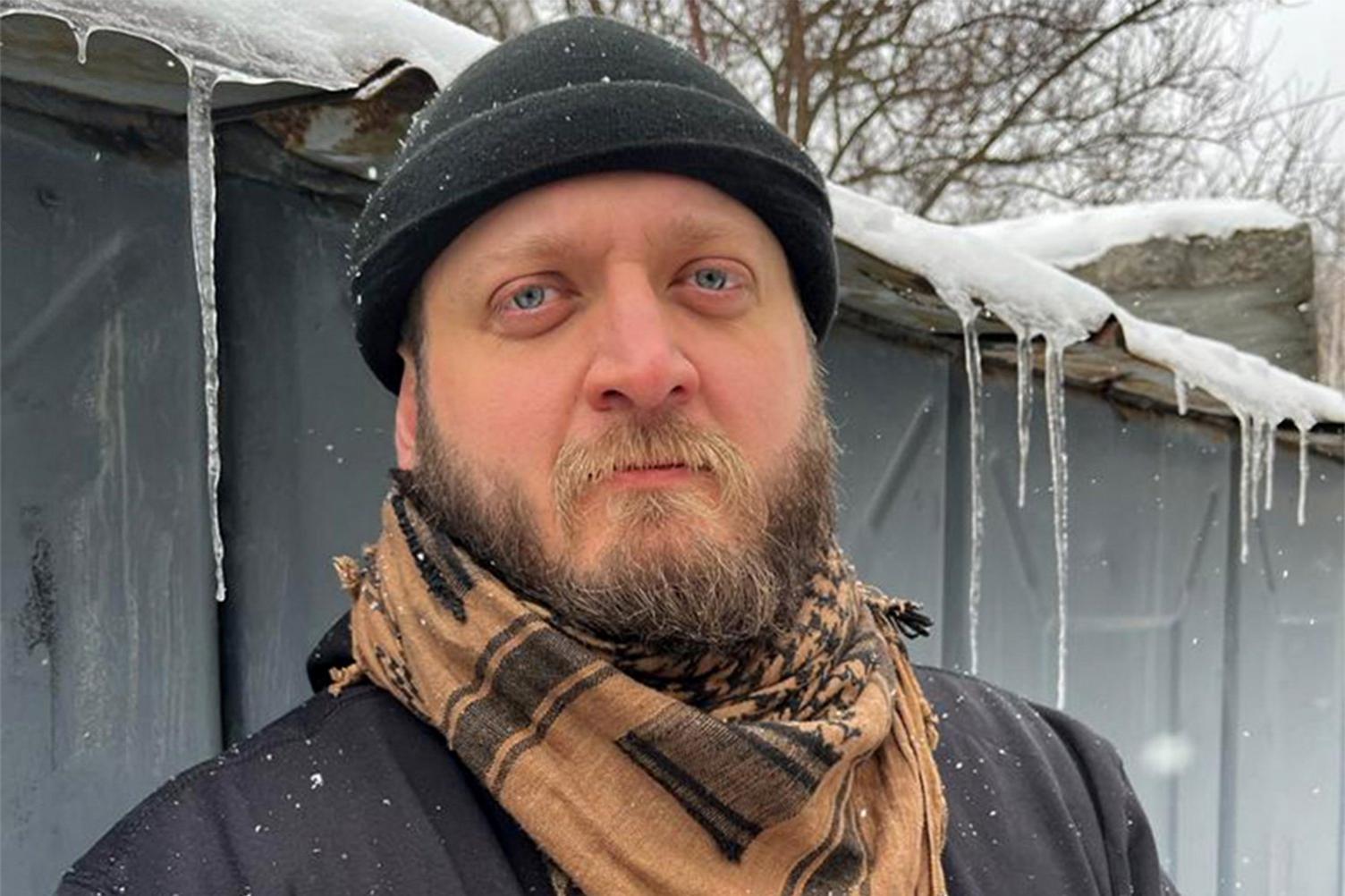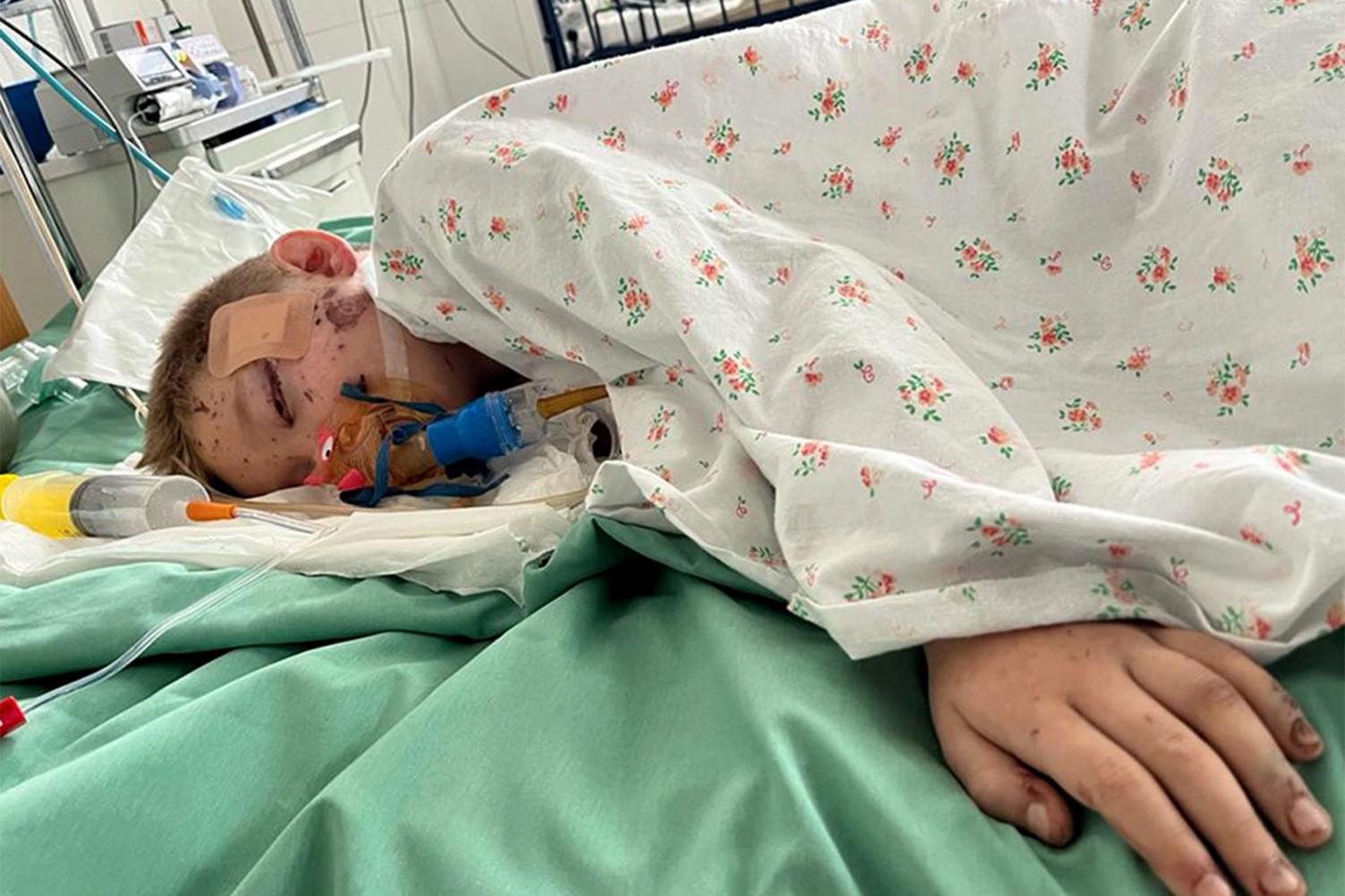Ukraine war: On the front line of the battle for Kharkiv
- Published

Lieutenant Yevgen Gromadsky
In the early days of the invasion, Kharkiv in eastern Ukraine fought back a Russian armoured column. Since then, it has suffered nightly Russian airstrikes and shelling, with dozens of civilians killed and hundreds injured. The BBC's Quentin Sommerville and cameraman Darren Conway have spent the week with the Ukrainian forces as they fight to stop a further Russian advance.
This report contains material some viewers will find disturbing
The first casualty of war is time. Ask the young soldier at the front when the attack happened, or the old lady in the hospital bed when her home was shelled, and they look at you confused. Was it 24 hours ago, or 48? The days have become one, they tell you.
In Kharkiv, Ukraine's second-largest city, time is elastic. It's close to the border with Russia and the nightly shelling from Russian artillery and warplanes gives no rest. The past two weeks have seemed like an eternity, yet peace can be remembered as if it were yesterday.
In a frozen landscape on the city's north-eastern edge, 21-year-old Lieutenant Yevgen Gromadsky stands with hands outstretched. There are trenches dug in nearby. "Outgoing," he says, lifting his right hand to accompany the thump of fire from his positions. "Incoming," he says, and his left hand ticks up. With a crump, Russian shells are fired from their positions 900m away across snow-covered fields.
The shelling continues like clockwork at the edge of this bombed-out village - "Incoming, outgoing, incoming, outgoing," Lt Gromadsky flicks his hands with each report.
We met only this afternoon, but already I know that just last week, his father Oleg was killed defending the city, and Lt Gromadsky is the seventh generation of military in his family. He plans for an eighth, in a free Ukraine.
He describes the fight so far, "Sabotage groups are probing our lines out, we have direct tank battles. They shoot with mortar shells at first, and then tanks fire at our positions."
White flag tactic
We move along the front lines from position to position. Inside his armoured vehicle, a Russian army hat - a trophy from their first capture - hanging from the ceiling, he continues, "We are shooting back with anti-tank guided missiles and also the usual small arms. They dismount, they scatter, there's always a lot of people."
Inside the truck there are Mexican Day of the Dead air fresheners. Grinning skulls hanging from every corner as we bounce along rutted dirt road. On the floor, rocket-propelled grenade launchers roll around.
From the front passenger seat Lt Gromadsky says, "Sometimes they use this tactic - first, they raise a white flag above their equipment, then come closer to our positions. When we come up and kind of take them as prisoners of war, they start to open fire on our troops."
The position was attacked on Monday (or was it the day before, he wonders), two Russian tanks and an armoured vehicle. "Don't worry, we are well defended," he says as he gestures to a pile of American-made Javelin guided anti-tank missiles. "Lockheed Martin, Texas," is written on their casing. Nearby, is a pile of British next-generation light anti-tank weapon (NLAW) missiles. "Eliminates even the most advanced tanks," its manufacturer Saab promises on its website.
It is bitterly cold and two puppies are playing around Lt Gromadsky's feet. His shoes are a pair of white Puma trainers - "You need to be fast out here," he says.
The Ukrainians are improvising in this war. Their government has been criticised for being ill-prepared, and now there is a rush to bring men forward to the front. The regular army is being merged with civilian defence forces. At a marshalling point on the city's eastern edge, I watch as buses arrive with hundreds of freshly equipped soldiers. "Where's my body armour?" asks one. "You'll get it at the front," yells an officer, and moments later they are gone.
Watch: Our correspondent on the front line, with Ukraine’s troops - this report contains graphic images of casualties
Some will be joining Lt Gromadsky's unit and working alongside a medic who goes by the name of Reaper. "You've heard of the grim reaper, right?" he asks. He's also in command of this defence line at the edge of a village. Many of the homes there have been destroyed or damaged by Russian shelling.
How are the Russians fighting, I ask. "They fight like stupid animals," says Reaper. "They fight like it's 1941 - they have no manoeuvrability, they just come to the front and that's all. They have a lot of people, a lot of tanks, a lot of vehicles, but we are fighting for our land, and we are protecting our families. it doesn't matter how they fight because we fight like lions and they won't win."
Back in the rear, the field kitchen is in a coffee shop. The army cook is reassuringly large with a knitted hat atop his head. He offers bowls of steaming hot borscht - "Have sour cream with it," he insists. There are piles of cakes and biscuits, made by local factories for the troops.
I sit beside a 30-year-old battalion commander, Sergey. "We see the enemy, we kill the enemy, there's no conversation, that's it," he says. He wants to know where I'm from. I tell him and he asks if it's true that British volunteers have come to fight for Ukraine. "What aircraft have you given us," he says as he finishes his borscht.

Battalion commander Sergey
But across the east and south of Ukraine, Russia has been advancing. The Russian army has met more determined resistance than it expected, but cities continue to fall. And for all their front-line courage, there is a recognition that their abilities on the ground will not be enough. Soldier after soldier says they need air defence, a no-fly zone.
I get inside another armoured vehicle, which two weeks ago was doing cash pickups at the city's banks. It, too, has now been put into the war effort. As we drive through the city, with its wide boulevards, and fine buildings, we reach a Soviet-Era apartment complex. And there I meet Eugene, a great Viking of a man, heavily tattooed with an orange beard.

Eugene is part of a reconnaissance team
"If Kharkiv falls, then all of Ukraine falls," Eugene, 36, tells me. He's a part of a reconnaissance team working near apartment blocks. Some of the flats have taken direct hits and in the car park, a car lies ripped apart from another grad missile strike.
What there isn't here in Kharkiv, is any surprise at the Russian attack. "Since 2014 we knew they would come, maybe in a year, 10 years, or 1,000 years, but we knew they would come".
At 04:55 on 24 February, Eugene received a call from a friend saying the attack was about to begin. "Then I heard the rockets attack our city," he says. Like everyone else he hasn't been home since.

Leaving the front to return to the centre of the city is almost like entering another world. The relentless Russian shelling has meant that most of the 1.5m population has fled. Few neighbourhoods have escaped some kind of damage. Early in the mornings, queues can still be seen at pharmacies, banks, supermarkets and petrol stations, as those who stayed behind stock up on supplies. A huge logistical and humanitarian effort is going on behind the scenes to keep Kharkiv running.
Before curfew I make my way to the city's Hospital Number 4 to meet Dr Alexander Dukhovskyi, head of paediatrics. Underneath his hospital whites, he's wearing a Miami Beach 2015 T-shirt, with the American flag. He hasn't gone home in weeks.
Watch: How Russia is using tactics refined over a decade in Syria
He laughs when I say that Russia says it isn't targeting civilians. Then, silently, he takes me down corridor after corridor of victims of Russian attacks. They are in the hallways because Russian shells have landed nearby, so the patients aren't safe in the wards with large windows. Most here were injured while at home.
The children's intensive care unit is on the ground floor. Its narrow windows catch the brilliant light from the snow outside and glint over the golden icons of saints above the nurses' station.

Dmitry in intensive care
In a bed nearby is eight-year-old Dmitry. His toes poke out from under the blanket and a hand, bruised and bloodied peeks out too. His face is scraped and scarred with hundreds of marks, his right eye is not quite closed. A few days ago, the doctors removed a bullet from under his skull and vertebrae.
It is hoped he'll make a full recovery, but for the moment he's in a sorry state, with tubes taking out fluids from his small body in plastic bottles hanging beneath his bed. The thin blanket with tiny roses on it, rises and falls with his mechanical breathing.
Watch: Doctors removed a bullet from between Dmitriy's skull and vertebrae
Vladimir Putin said he wanted to demilitarise Ukraine, instead he's creating a no-man's land. At night the city is in near total blackout. A steady beat of Russian strikes fall through the night.
Kharkiv was once Ukraine's capital - it has the parks, cathedrals, museums and theatres you would expect, as well as the Antonov aircraft factory and tank and turbine manufacturers.
All of the city is now a front line.
And this, too, should come as no surprise. The Russian war-playbook has been perfected in Syria over the past 10 years. Surround, besiege, and terrorise the population. In Ukraine, as in Syria, the population is being bussed out of their home cities as Russian forces continue their advance.
But still Ukraine resists.

I meet an intelligence team, who drive with anti-tank missiles ready to use in the back of their vehicles. Again, I head to the city's edge, and pass through the front lines into a wasteland. Two petrol stations just outside the city that have been destroyed by shelling and gunfire.
Lying in the snow, are a dozen or so frozen Russian corpses. The men lie like wax figures, some with hands reaching out, their matted beards frozen stiff in the cold.
The guts of one are spilled across the forecourt. There are blood-red footprints around his corpse. Their weapons have been taken, and I ask Uta, one of the officers, what will happen to the bodies.
"What do you think will happen, we will leave them for the dogs," he says with a shrug.
And at this miserable spot on Kharkiv's edge, unremarkable for its ordinariness two weeks ago, surrounded by frozen corpses, it's as if time is standing still.

Are you or your family in Ukraine? Please share your experience if it is safe to do so by emailing haveyoursay@bbc.co.uk, external.
Please include a contact number if you are willing to speak to a BBC journalist. You can also get in touch in the following ways:
WhatsApp: +44 7756 165803
Tweet: @BBC_HaveYourSay, external
Please read our terms & conditions and privacy policy
If you are reading this page and can't see the form you will need to visit the mobile version of the BBC website to submit your question or comment or you can email us at HaveYourSay@bbc.co.uk, external. Please include your name, age and location with any submission.

War in Ukraine: More coverage
CITY SURROUNDED: Efforts to reach Mariupol trapped
WAR CRIMES: Could Putin be prosecuted?
IN DEPTH: Full coverage of the conflict
